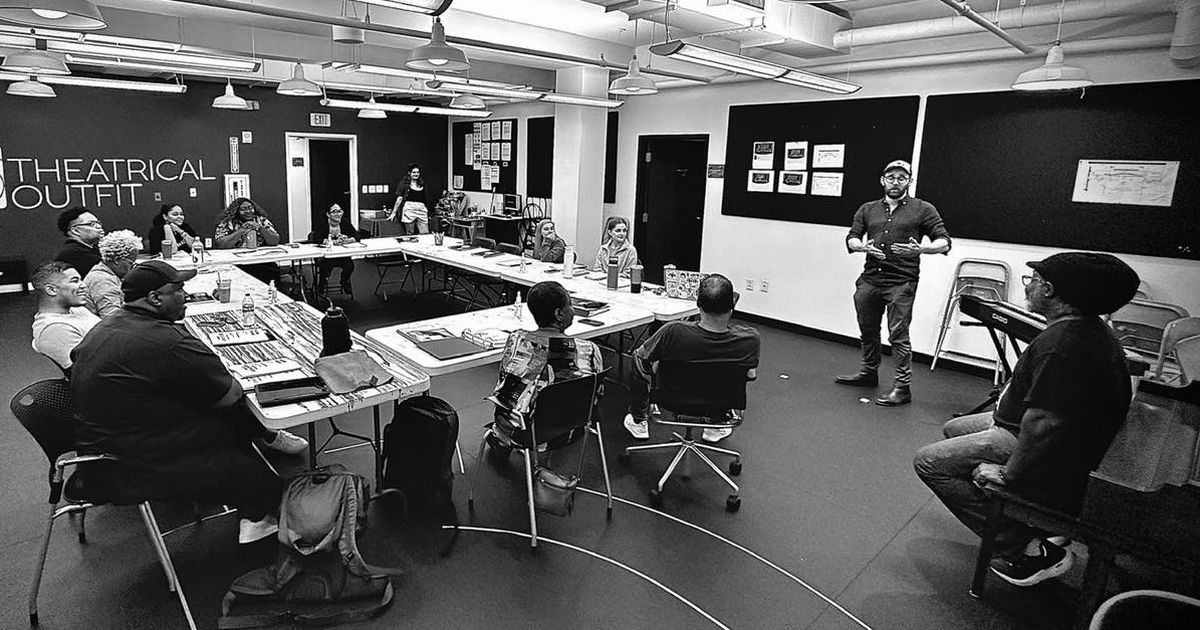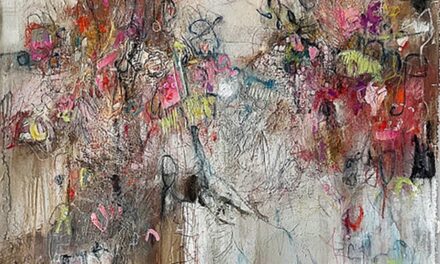
This story was originally published by ArtsATL.
It’s often said that most people spend their adulthood trying to get over childhood. Youth, the main character in the roaring rock musical “Passing Strange,” spends his 20s running from the first 18 years of his life.
Raised in a Black, middle-class family in Los Angeles — with all the respectability to politics and church therein — he heads to Europe as soon as he’s old enough and forms a band called The Negro Problem.
Like other Black ex-pats such as Josephine Baker, Langston Hughes and James Baldwin, Youth finds a group of bohemians with whom he can become his true self. However, as it is with all great musicals, the road to self-discovery and healing always leads back home.
With book and lyrics by Stew, “Passing Strange” ran at the Belasco Theatre on Broadway in 2008 and took home the Tony Award for Best Book of a Musical. The score of the musical is inspired by the blues, funk, jazz and rock of the 1970s and 1980s, with heavy nods to James Brown, Miles Davis, Jimi Hendrix, Eric Clapton, Queen, Parliament-Funkadelic and Prince.
Now, with director Thomas W. Jones II (“Blackberry Daze” and “Sweet Water Taste” at Horizon Theatre) at the helm, Theatrical Outfit is staging “Passing Strange” through Oct. 22.
This production features musical direction by S. Renee Clark (“Five Guys Named Moe” and “110 in the Shade”) as well as some of Atlanta’s most popular performers, including Christian Magby (“In the Heights”), Trevor Perry (“Five Guys Named Moe”), Bradley Raymond (Alliance’s “Christmas Carol”), India Tyree (Aurora Theatre’s “Cinderella”) and gospel singer Latrice Pace, who has offered her talents to local productions of “The Color Purple” and “The Wiz.”
Credit: Courtesy of Theatrical Outfit
Credit: Courtesy of Theatrical Outfit
ArtsATL sat down with Jones to dig into why this musical still resonates more than a decade later.
Q: What is this musical about to you?
A: I think it’s about a prodigal son who comes home one day late. As Stew wrote it, it’s a story about a boy and his mom. He’s trying to reconcile the guilt he feels when he realizes he ran away from her. It’s about the mistakes you make from your youth, zeal and zest, how the struggle to be right and justified damages your relationships and how you struggle to repair them. Night after night, it’s like a Groundhog Day, to ask if I had made a different choice, what would it be?
Q: Part of what drives Youth away are the conventions of the conservative Black middle class, which in some ways the musical offers a send-up and some reverence for those values. The church is where Youth is ridiculed but also where he finds music.
A: Once Youth/Narrator found something in himself that was authentic — but didn’t fit Black middle-class values — he was ridiculed for it, so he ran. The Black middle class is an invention in a space allowed to us by a ruling class. In the 1960s, the United States was engaged in civil war over justice and poverty. As a result, you had a series of attempts at quelling that radical activism, and part of that included expanding the middle class to include more people. If you create “house Negroes,” they will protect the house, and that was the middle class in the ‘70s.
We are protecting the thing that was complicit in our own destruction. If you get slapped down because of that, you’re going to run like Josephine Baker or James Baldwin. Baker was a comedian in blackface in America and became an international sex symbol in Paris. She’s able to access a part of herself overseas that she can’t in America because, in the 1920s, Black women weren’t allowed to be beautiful out loud.
Credit: Courtesy of Theatrical Outfit
Credit: Courtesy of Theatrical Outfit
Q: As you stated, the core of the musical is about mothers and sons. Do you see parallels in your relationship with your own mother?
A: I do see parallels. I grew up in a nuclear family, and there were things my mother and sisters asked of me that didn’t play out on the playground. There are certain expectations that are put upon Black men in society, and, at about age 12 or 13, you have to figure out how to navigate the world. You begin to find your image or your strength. And if there’s a prominent male figure, you have to reconcile your identity through their translation. Depending on who/what the male influence is, that’s where you will lean.
That’s what happened with Youth/Narrator. He has a moment of revelation in church (when he joins the choir) and meets an older man who helps him connect gospel to the blues and rock ‘n’ roll. But his mother’s response is, “I don’t want you to embarrass me in public.”
That tells him, “I can’t be myself with you,” so he runs. Once we went through the text and did the table work, I said to the cast, “This play isn’t what you think it is.” I think everyone examined their relationships. Everyone walks that fine line of expectation in a social circle.
Q: There’s a line in the show: “Music is the great train on which God travels.” What does that mean to you?
A: That for Youth, Stew and for us, there is a tradition that you find God in the church. The line in Ntozake Shange’s play “For Colored Girls” is “I found God in myself … And I loved her fiercely.” Where do you find God? Where do you get that salvation if you don’t find it in church? If you believe in a higher power, and there’s something revelatory about your life, where does that consciousness come from? The music is where you find your truth.
Q: What do you want audiences to take away from the experience of seeing “Passing Strange”?
A: First of all, I want their ears pinned back because of what they’ve experienced. I also want them to ask, “Am I the person or human that I envision myself to be, or am I living a lie? Can I summon the strength to become who I imagine myself to be?” That’s work. That’s hard.
I work on that every day. Something I often say is, “I’m not what I said I was, but I’m better than what I was.” If I can do that, it’s worth still being on the journey. In the musical, for Youth/Narrator, that’s revealed in a relationship with someone he cares about and loves the most because that’s where it’s tested.
MUSICAL PREVIEW
“Passing Strange”
Through Oct. 22. 7:30 p.m. Wednesdays-Saturdays; 2:30 p.m. Saturdays-Sundays. $15-$65. Balzer Theater at Herren’s, 84 Luckie St. NW, Atlanta. 678-528-1500, theatricaloutfit.org
::
Kelundra Smith is the managing editor of American Theatre, an ArtsATL editor-at-large, a critic and an arts journalist. Her mission is to connect people to cultural experiences and to each other. Her work appears in The New York Times, ESPN’s Andscape, American Theatre and elsewhere. She is a member of the American Theatre Critics Association and the Society of Professional Journalists.
Credit: ArtsATL
Credit: ArtsATL
MEET OUR PARTNER
ArtsATL (www.artsatl.org), is a nonprofit organization that plays a critical role in educating and informing audiences about metro Atlanta’s arts and culture. Founded in 2009, ArtsATL’s goal is to help build a sustainable arts community contributing to the economic and cultural health of the city.If you have any questions about this partnership or others, please contact Senior Manager of Partnerships Nicole Williams at nicole.williams@ajc.com.



